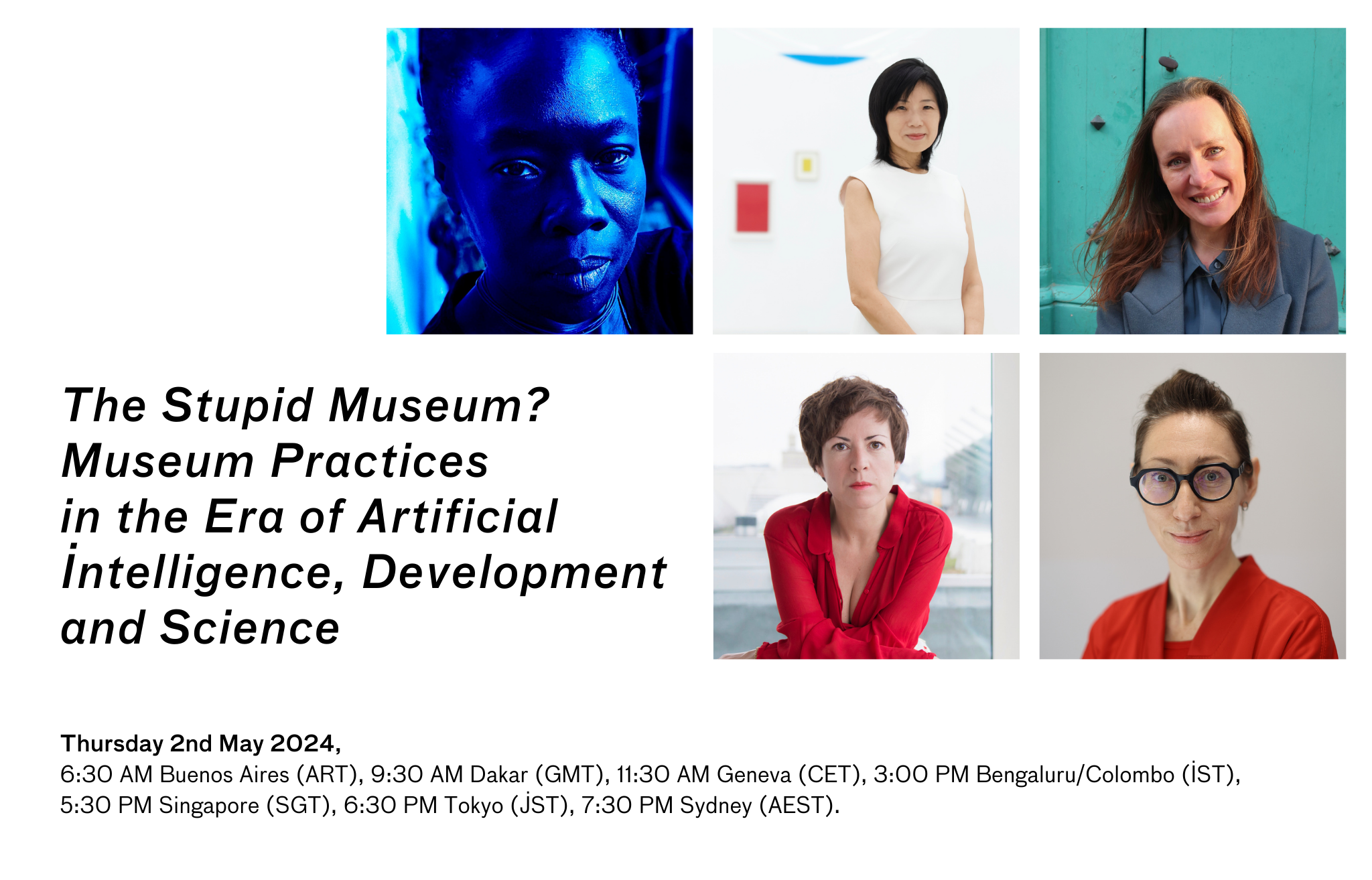The Stupid Museum?

The Stupid Museum? Museum Practices in the Era of Artificial Intelligence, Development and Science.
Thursday, 2 May 2024 at 11:30 am CEST (Central European Summer Time)
- Buenos Aires – 6:30 am.
- Dakar – 9:30 am.
- Geneva – 11:30 am.
- Bengaluru – 15:00 hrs.
- Singapore – 17:30 hrs.
- Tokyo – 18:30 hrs.
- Sydney – 19:30 hrs.
Rapid Response Webinars are free of cost for CIMAM members:
Register here if you are a CIMAM member.
Non-CIMAM members can attend the webinar by paying 10,00€, which will be deducted from their membership fee if they join CIMAM in the next 3 months:
Registration for Non-CIMAM members.
Abstract:
Museum & Science. How art supports and co-creates an awareness of science goals? Consequences of AI.
Discourses dealing –and around– artificial intelligence often takes it as a given, as if AI constitutes new living and social condition that we must assume. But we may frame the question differently: what if the task museums should assume is to discover what the museum can do for artificial intelligence? and how artistic and museum practices can program this tool with new values leading it into different uses and functions for art and culture? Discovering how we can interact with data and create new spheres of study, research and education thanks to digital tools, technology and science should be part of our debate today.
Guest panelists:
- Mónica Bello, Curator and art historian, Head of Arts at CERN, Geneva, Switzerland.
- Yuko Hasegawa, Director, 21st Century Museum of Contemporary Art, Kanazawa, Japan.
- Onome Ekeh, Writer and Filmmaker.
Moderated by CIMAM Board Members: Chus Martínez, Director, Art Gender Nature Institute HGK, Basel, Switzerland and Malgorzata Ludwisiak, Artistic Director, Museum of Modern Art in Warsaw, Poland.
Biographies:
Mónica Bello
Curator and art historian, Head of Arts at CERN, Geneva, Switzerland:
Mónica Bello is a Spanish art historian and curator. Since 2015, she has held the position of Head of Arts at CERN at the at the European Organization for Nuclear Research in Geneva. In this pivotal role, she provides strategic leadership and oversight for the laboratory's art initiatives, directing the conception and implementation of the artistic programs, including artistic residencies, art commissions and exhibitions. Recent curatorial projects are the opening exhibition Exploring the Unknown at CERN Science Gateway; the Icelandic Pavilion at the 59th Venice Biennale represented by artist Sigurður Guðjónsson; Dark Matters at Science Gallery Melbourne; Quantum/Broken Symmetries, a touring exhibition in six different art centres in Europe and Asia; and the Audemars Piguet Art Commission for Art Basel. Before coming to Geneva, Bello served as Artistic Director of VIDA, the Art and Artificial Life Award at Fundación Telefónica, Madrid.
Yuko Hasegawa
Director, 21st Century Museum of Contemporary Art, Kanazawa, Japan:
Yuko Hasegawa is a curator, educator and writer based out of Tokyo. She currently holds positions as Director of the 21st Century Museum of Contemporary Art, Kanazawa, Professor Emeritus of Tokyo University of the Arts, Visiting Professor of Research Institute for Humanity and Nature, Artistic Director of the Inujima Art House Project, and Program Director, Art and Design of the International House of Japan. She was also Visiting Professor at the Department of Philosophy of Ca’ Foscari University of Venice in 2023, and the Artistic Director of the Museum of Contemporary Art, Tokyo until 2021 where she curated solo exhibitions of Dumb Type, Olafur Eliasson and rhizomatiks among others.
She has curated Japanese contemporary art and media and technology extensively both domestically and internationally. Her curatorial language is interdisciplinary, encompassing not simply art but also architecture, design, science and anthropology, and combined with global curating experience, allows her to view art as part of a single, holistic ecology.
Hasegawa has also curated, either solo or in a joint capacity, international art biennials including the 7th International Istanbul Biennial (2001), the Shanghai Biennale (2002), the 29th São Paulo Biennial (2010), the Sharjah Biennial 11 (2013), and the 7th Moscow Biennale (2017), Thailand Biennale, Korat (2021) and also served as art advisor to the 12th Venice Architecture Biennale (2010).
Onome Ekeh
Writer and Filmmaker:
Onome Ekeh is a writer and designer of speculative spaces. Born and raised on both sides of the Atlantic, she started out as a painter, gravitated towards design, and then fell in love with film. Somewhere in the collision, she submerged into the digital world and discovered Artificial Intelligence. She produces works that spans film, video, theatre, literature and radio. She is currently a lecturer at the FHNW Academy of Art & Design in Basel, Switzerland. She is also the co-founder and creative director of digital boutique Futurezoo and her collected visuals and fiction can be found at thememorexe.com
Malgorzata Ludwisiak
Artistic Director, The Museum of Modern Art in Warsaw, Poland:
Malgorzata is an art historian, curator, art critic, an expert in museum management and academic teacher. Since 2021, Malgorzata has been Chief Curator of Modern Art Department in the National Museum in Gdansk (Poland), where she is responsible for three venues for modern and contemporary art. Malgorzata is currently working on a completely new permanent exhibition of the collections as well as on the 2-years program dedicated to the relationship between climate, art and museums. As a director of Center for Contemporary Art Ujazdowski Castle in Warsaw (2014-2019), along with the team they were looking for both experimental programming and new institutional formats. As a vice-director of the Muzeum Sztuki in Lodz (2008-2014), she was responsible mainly for developing public program, education and audience development. Among curated projects, she is especially proud of contributing to CIMAM conferences (2021 and 2022); an international public program "Curating Institution" (2016-2019, CCA in Warsaw); an exhibition "El Hadji Sy. At First I Thought I Was Dancing" (2016, CCA in Warsaw) reflecting on questions of community and performativity seen through a lens of Dakar, and "Correspondences. Modern Art and Universalism" (with Jaroslaw Lubiak; 2012-13, Muzeum Sztuki in Lodz), which created a dialogue between two collections of 20th and 21st century art: of Kunstmuseum Bern and Muzeum Sztuki in Lodz, applying Walter Benjamin’s notion of passages as a method for re-reading modernity and the very status of an art work. What most interests Malgorzata in her theoretical research and practical approach is a present and future social role of museums – especially in the face of the climate catastrophe.
Chus Martínez
Director, Art Gender Nature Institute HGK, Basel, Switzerland:
Born in Spain, Chus Martínez has a background in philosophy and art history. She is currently the Head of the Institute of Art of the FHNW Academy of Arts and Design in Basel, Switzerland, and associate curator of TBA21as well as curator at large at The Vuslat Foundation in Istambul. She sits on the advisory boards of numerous international art institutions, including Castello di Rivoli, Turin; De Appel, Amsterdam; Deutsches Historisches Museum, Berlin; and Museum der Moderne, Salzburg. She has been the Chief Curator at El Museo Del Barrio, New York and dOCUMENTA (13) Head of Department. Previously she was Chief Curator at MACBA, Barcelona, Director of the Frankfurter Kunstverein. Martínez has organized numerous exhibitions and publications with contemporary artists. She lectures and writes regularly including numerous catalogue texts and critical essays, and is a regular contributor to international journals. She recently published a book of essays, The Complex Answer, Sternberg Press 2023.
Sessions are recorded and posted in the Members Only section of the CIMAM website for those who missed the time.

CIMAM 2024 Rapid Response Webinars are made possible with the support from the Getty Foundation through its Connecting Professionals/Sharing Expertise initiative.